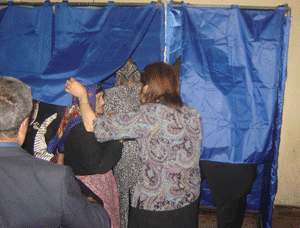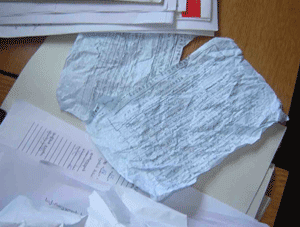Nini Topuridze
 What methods are most popular in Georgia to rig the elections, and whether it is possible to carry out fair municipal elections on May 30 to show the real choice of the people? These questions have become more and more urgent for the political parties participating in the elections recently. The humanrights.ge interviewed the board chairman of the International Center of Civil Culture Kote Kandelaki who has been observing the elections for several years and studies the features of the Georgian elections.
What methods are most popular in Georgia to rig the elections, and whether it is possible to carry out fair municipal elections on May 30 to show the real choice of the people? These questions have become more and more urgent for the political parties participating in the elections recently. The humanrights.ge interviewed the board chairman of the International Center of Civil Culture Kote Kandelaki who has been observing the elections for several years and studies the features of the Georgian elections.
-Mr. Kote, what are the most popular methods to rig elections in Georgia?
-The traditional form of the fabrication is so-called “carrousels”; it is very difficult for an observer to discover them. During the “carrousel” a resident of one district votes in another one. For that purpose, the fabricators use passports instead IDs because the document does not contain the address. The registrars working at the polling stations often cooperate with fabricators.
There is one more form of the carrousel – Armenian carrousel when an observer gives already marked ballot paper to the voter and instead returns the empty one. The voter drops the previously marked ballot paper in the ballot box. It is almost impossible to detect similar violation unless the fabricator confesses it.
-How are the international observers deceived?
-International observer does not interfere in the election process as actively as the local one. They observe the procedure from distance and pays attention how legal the process is. The main problem is that international observers visit PS for a short time and do not stay there all day long. Very often, opposition and ruling parties make a deal at the PS and fabricate the elections together. For example, very often they say: “Let me do my job and I will increase your votes too,” based on similar agreements the reputation of the political party is damaged and then they cannot work for their reputation claiming – we have gained so many votes in this PS. Thus, all 13 members of the election commission cannot have one opinion and participate in fabrication together. Consequently, nobody will complain before the international observer at all.
-What can seem suspicious to the observer in this situation?
-Anyway, it is not very difficult to get suspicious in the situation. The protocol shall be filled in properly. If you record the number of voters by 12:00 am and then by 5:00 pm and finally you will see that number of voters is too increased, the fabrication is easily detectable. For example, all voters cannot come to the PS between 5:00 pm and 8:00 pm. For the prevention, observer should count voters who get registered in the PS. If the elections are rigged and the commission members try to increase the number of voters artificially, the fabricator will not manage to sign the protocol. After the ballot box is sealed up, the number of envelopes shall coincide with the number of voters who visited the PS.
-People often speak that opposition parties sell their mandates in the election commissions. Do you have any concrete information about it?
-Every party shall declare where they have representatives. There are 3 615 polling station sin Georgia; if every party had so many members in each PS, all of them would have passed the 7% barrier. In fact, in Georgia, parties do not have so many members. Thus, the members of the commissions in the regions are selected among acquaintances and based on recommendations. However, complete strangers are also selected. Then these people make deals with other parties in the name of their parties. Somebody may benefit financially from it. In the past there were cases when political party did not know their commission members outside Tbilisi. Very often, the observers are in a deal with the commission members; even NGOs make deals with them.
-How should observers act and prevent the violation?
-First of all, the number of voters who came to the PS shall be counted; or they also should register the voters separately. If an observer registers the voters, she can miss only 20-30 people. When the box is unsealed and you will see that the number of envelopes in it is much more than you have registered, the observer will guess that ballot papers are “dropped” illegally. And most important – the impartial observer should not leave a PS even for one minute.
The methods of fabrication are the same as the methods used in previous years. However, now they do not use the rude forms of fabrication any longer. If the competition between the parties increases, if several candidates are rivals in one district, fabrication cannot be large-scaled. In similar situation the political parties control the PS very strictly. It creates more chances for the fair elections. It would be nice if cameras were installed in the PS as a form of prevention but nobody will accompany the voter into the booth.
-Should we expect anything particular during these elections?
-I do not know what they will offer us this time. The people, who are skilled in rigging elections, create additional problems. During the presidential elections in 2008 they were replaced but later the parties needed them urgently and recruited those people again. The same people are chairpersons of the election commissions for many years.
The Human Rights Centers publishes the list of fabrications that might be observed during the elections; the list was provided by Kote Kandelaki.
1. To oppress voters to participate in the elections in favor of any party or candidate (physical, psychological or financial oppression);
2. Early opening and late closing of the polling stations;
3. To close the polling station for some time when it is not necessary;
4. Selfish amendments to the election procedures by the commission members;
5. Participation of the people without authority in the election administration;
6. Violation of the right to secret polls;
7. Assisting the voters by unauthoritative people;
8. Agitation in the polling station; advertising banners at the polling station;
9. Not to allow voters to enter the PS; to involve them in the quarrel in order to send them out from the PS; to attract the attention of the observers by false phone calls;

10. To give the ballots without providing IDs or signature;
11. To give more than one ballot paper to each voter;
12. To drop additional ballot-papers in favor of any party or a candidate;
13. To vote in more than one polling stations;
14. To prolong or suspend the procedure of counting votes;
15. To destroy or steal the ballot box;
16. Participation of non-commission members in the counting process of the votes;
17. To destroy the ballot-paper which was marked in favor of the undesirable party;
18. To change the ballot paper into a ballot paper which is already filled in for the desirable party;
19. To mix up the ballot papers fallen out of the ballot box with the papers which are marked in favor of any political party;
20. To exchange the results of the votes between political parties and register it in the protocol;
21. To falsify signatures of the commission members or voters in the registration list in order to increase the number of voters;
22. To count the envelopes fallen out of the ballot box or to mix them up with the ballot papers fallen out from the ballot box when there are no reasons for it;
23. To prevent voters to include information in the book of complaints about violations;
24. Violation of the polling procedure – presence of the people in the polling who do not have similar right;
25. Violation of the post-polling procedures (not to check the sealing up procedure);
26. Violation of the marking and checking procedure (not to check the marked person on purpose);
27. Not to sign the ballot paper or not to confirm it by special seal;
28. Not to seal the ballot box when the elections finish;
29. To call the policemen to the polling station because of the threats to the polling procedure or for the transportation of the election documentation;
30. Not to allow observers to attend the counting process and all other necessary procedures.
News
December 13, 2023
Ethnic minorities outside the peace dialogue
November 6, 2023
‘Peace’ agenda of political parties
Popular
Articles
February 13, 2024



